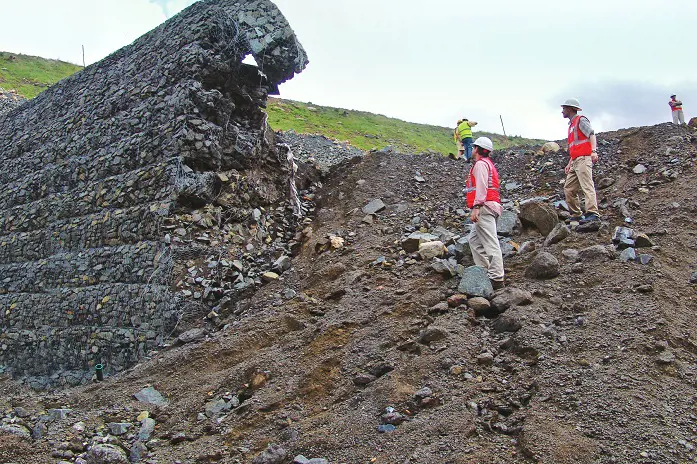How a Geotechnical Specialist Can Ensure the Success of Your Structure Structures
How a Geotechnical Specialist Can Ensure the Success of Your Structure Structures
Blog Article
The Value of Geotechnical Design in Dealing With Environmental Challenges and Enhancing Building Security
Geotechnical engineering offers as a foundation in the crossway of ecological stewardship and building and construction safety, giving crucial insights right into the habits of dirt and rock under various problems. By implementing tactical website examinations and tailored mitigation steps, geotechnical engineers play an essential duty in guarding both human lives and ecological integrity.

Role of Geotechnical Engineering
Geotechnical engineering plays an essential duty in the style and building of framework by resolving the habits of soil and rock materials under numerous problems. This area of design is crucial for understanding the communication between structures and the ground, that includes identifying the load-bearing ability of soil, analyzing security, and predicting potential settlement or failure.
Geotechnical designers are accountable for carrying out website investigations, which include tasting and screening soil and rock to gather information on their physical and chemical residential properties. This details is essential for making structures, preserving walls, and various other earth-retaining frameworks that make sure safety and durability. Additionally, geotechnical design notifies the option of suitable building and construction approaches and materials, thereby lessening dangers linked with dirt behavior.
Moreover, the combination of geotechnical design concepts into urban preparation and ecological monitoring is critical for attending to challenges such as ground contamination and groundwater management. By understanding geotechnical factors, designers can develop lasting solutions that boost the strength of facilities against all-natural dangers, while likewise advertising ecological stewardship. Eventually, the duty of geotechnical engineering is essential for achieving secure, resilient, and ecologically aware construction methods.
Soil Erosion Reduction
Soil erosion postures a significant danger to both environmental security and infrastructure stability, affecting around 24 billion lots of abundant soil lost every year worldwide. This sensation is intensified by variables such as logging, urbanization, and bad agricultural practices. Geotechnical engineering plays a crucial duty in creating efficient dirt erosion mitigation methods that safeguard both the setting and building and construction tasks.
One strategy entails the execution of erosion control approaches such as plant life planting, which supports soil via origin systems. Additionally, the building of maintaining walls and terraces can efficiently reduce surface drainage and safeguard at risk areas from erosion. Correct water drainage design is likewise crucial; it reduces water build-up and directs excess overflow far from crucial structures.
Moreover, geotechnical engineers employ dirt stabilization methods, such as the application of geotextiles and biodegradable floor coverings, to enhance soil communication and protect against deterioration - all about geotechnical engineering. Normal surveillance and evaluation of erosion-prone sites enable prompt treatments, guaranteeing lasting sustainability. By incorporating these strategies, geotechnical engineering not just alleviates the influences of soil erosion but likewise adds to the resilience of infrastructure versus environmental obstacles, inevitably fostering a more secure and more sustainable developed setting
Groundwater Security Techniques
Groundwater works as an important resource for drinking water, agriculture, and commercial procedures, making its security essential for ecological sustainability and public wellness. Reliable groundwater defense techniques are important in reducing contamination risks and guaranteeing the longevity of this resource.

Normal monitoring of groundwater high quality is also necessary, making it possible for very early detection of contamination resources and promoting timely removal initiatives. Using innovative modern technologies, such as geophysical surveys and remote picking up, help in determining prospective dangers to groundwater books.
Moreover, public education and learning and stakeholder engagement are important, promoting neighborhood assistance for groundwater defense efforts. all about geotechnical engineering. By combining regulative procedures, technological developments, and community participation, we can produce a thorough framework that safeguards groundwater sources while promoting sustainable advancement and construction techniques
Landslide Danger Management
Landslides position substantial dangers to both human safety and security and infrastructure, making efficient risk administration techniques crucial. Geotechnical design plays a vital function in determining, examining, and mitigating landslide risks. A detailed understanding of incline stability, dirt technicians, and hydrology is vital for establishing efficient danger administration strategies.
The primary step in landslide danger management entails thorough site examinations, that include geological mapping and soil screening. These investigations aid designers review the potential for landslides by determining crucial variables such as slope angles, soil structure, and water web content. Utilizing advanced technologies such as remote sensing and geophysical studies can boost the precision of these analyses.
When dangers are identified, ideal mitigation actions can be carried out. These may include design remedies such as maintaining wall surfaces, drain systems, and incline stabilization methods. Additionally, keeping an eye on systems must be established to spot indications of ground motion and modifications in water levels, enabling proactive treatments.

Enhancing Building Safety And Security
Construction websites frequently you could try these out provide a myriad of dangers that can jeopardize employee security and task honesty. Geotechnical design plays a critical function in improving construction safety and security by supplying vital understandings into subsurface problems. Through thorough dirt and rock analysis, geotechnical engineers can identify possible risks, such as soil instability, groundwater issues, and seismic susceptabilities, which might compromise the security of building and construction activities.
Implementing geotechnical solutions, such as correct structure style and the usage of maintaining frameworks, reduces these risks dramatically. These services not only ensure the security of the frameworks being constructed but also produce a much safer working environment for construction personnel.
In addition, cultivating a culture of safety and security with training and adherence to established safety methods further boosts building and construction site security. By integrating geotechnical knowledge right into the planning and execution stages, construction projects can accomplish higher security requirements, ultimately protecting workers and making certain successful project conclusion.
Verdict
To conclude, geotechnical engineering offers as a crucial discipline in promoting and dealing with ecological difficulties building security. Through efficient dirt disintegration mitigation, groundwater security approaches, and landslide danger management, geotechnical designers contribute to the advancement of durable infrastructure. The combination of these techniques fosters a more secure building setting and boosts the sustainability of civil design jobs. Ultimately, the experience of geotechnical engineers is indispensable in securing both natural deposits and human lives versus possible threats.
Geotechnical design offers as a foundation in the crossway of environmental stewardship and building and construction safety, offering vital understandings right into the habits of soil and rock under numerous problems. Geotechnical anchor design informs the choice of suitable building and construction approaches and materials, thereby decreasing threats linked with soil behavior.
Geotechnical design plays a critical duty in developing efficient dirt erosion reduction strategies that guard both the setting and building jobs.
Moreover, geotechnical engineers utilize dirt stablizing strategies, such as the application of geotextiles and naturally degradable mats, to enhance soil communication and protect against deterioration. Via thorough soil and rock evaluation, geotechnical designers can recognize possible dangers, such as soil instability, groundwater issues, and seismic susceptabilities, which may endanger the safety and security of building and construction activities.
Report this page